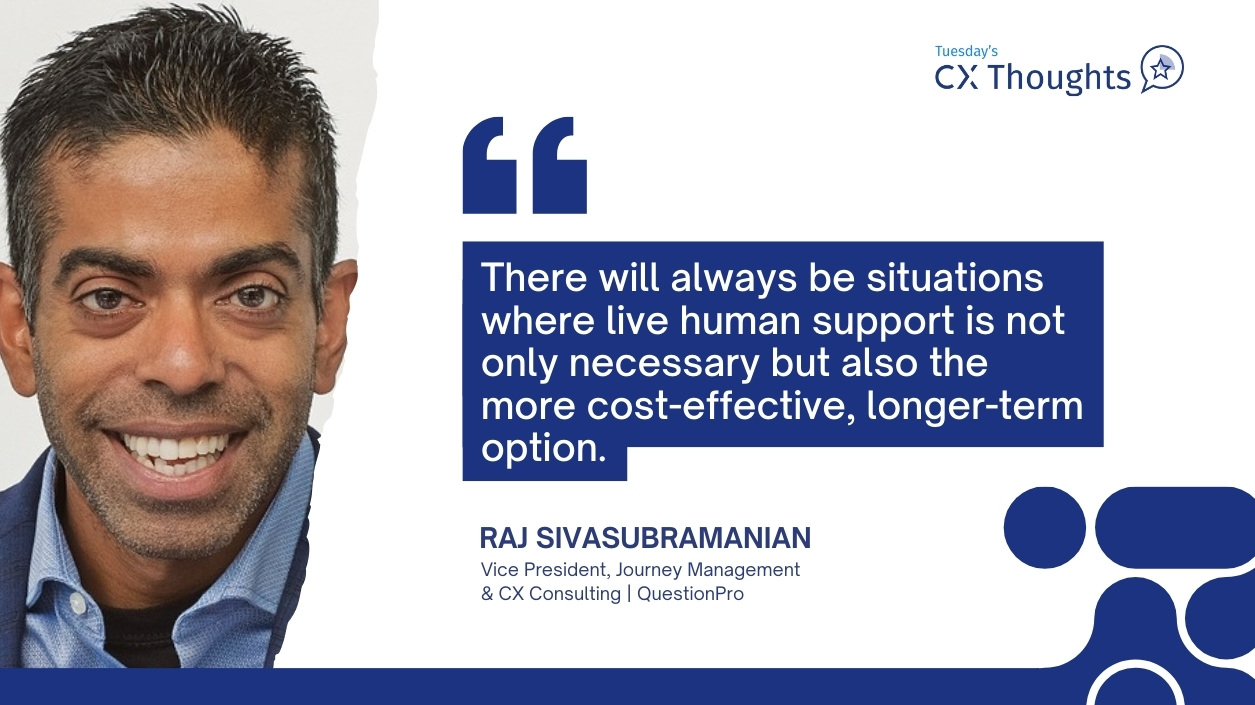
Understanding your market is crucial for success. However, market research can be expensive, impacting small businesses and entrepreneurs. Thankfully, there’s good news – you don’t need a big budget to gather valuable insights about your customers and industry trends. Businesses of all sizes can now use free market research tools to make informed decisions and remain ahead of the competition.
From survey platforms to trend analysis tools, these resources offer a wealth of information at no cost. So, these tools can be your secret weapon for success, whether you’re just starting or looking to expand your existing business.
In this blog, we’ll look at the top 10 free market research tools to help you supercharge your business growth.
What are Free Market Research Tools?
Free market research tools are helpful resources anyone can use without spending money to learn about markets, customers, and competitors. These tools give insights that can be used to make smart business decisions.
Some of these tools let you ask people questions through surveys or check what topics are popular online. Others show how many people are visiting your website or your competitors’ sites. There are even tools that help you see what people are saying about your business on social media.
These tools are great because they’re usually available online and don’t cost anything to use. They give businesses important insights without needing to spend a lot of money on fancy research. By using these tools smartly, businesses can make better decisions and sell more successfully.
Benefits of having Free Market Research Tools
These tools provide valuable insights into consumer behavior, industry trends, and competitor strategies without breaking the bank. Here, we’ll explore the benefits of leveraging free market research software and how they can help businesses thrive.
- It Save Your Money: With free market research tools, you can unlock valuable insights without spending a single penny. That means you can still gather important market research data to fuel your business decisions, even if you’re running on a tight budget.
- Making Smarter Moves: Forget relying on guesswork. Free market research tools arm you with real data to make informed decisions. Say goodbye to blind leaps and hello to calculated steps toward success.
- Staying One Step Ahead: Keeping an eye on your competitors is key to staying ahead. Free market research tools let you peek into what your competitors are up to, helping you fine-tune your marketing strategies and stand out.
- Understanding Customer’s Language: Have you ever wished you could read your customers’ minds? Market research tools won’t give you psychic powers, but they’ll come close. By understanding your customers’ preferences and behaviors, you can tailor your products and messages to speak directly to their hearts.
- Building Better Products: Who doesn’t love a product that’s a perfect fit? With market research tools, you can gather feedback from your target audience and tweak your products until they’re just right. It’s like having a focus group without the hefty price tag.
- Putting Smiles on Your Customers’ Faces: Happy customers are the lifeblood of any business. Market research tools help you understand what makes your customers tick so you can delight them with products and experiences that keep them coming back for more.
10 Free Market Research Tools You Should Know
From survey platforms to analytics tools, these tools offer valuable insights into consumer behavior, industry trends, and competitive analysis. Here, we’ll explore 10 free and best market research tools that every business owner should know about.
1. QuestionPro
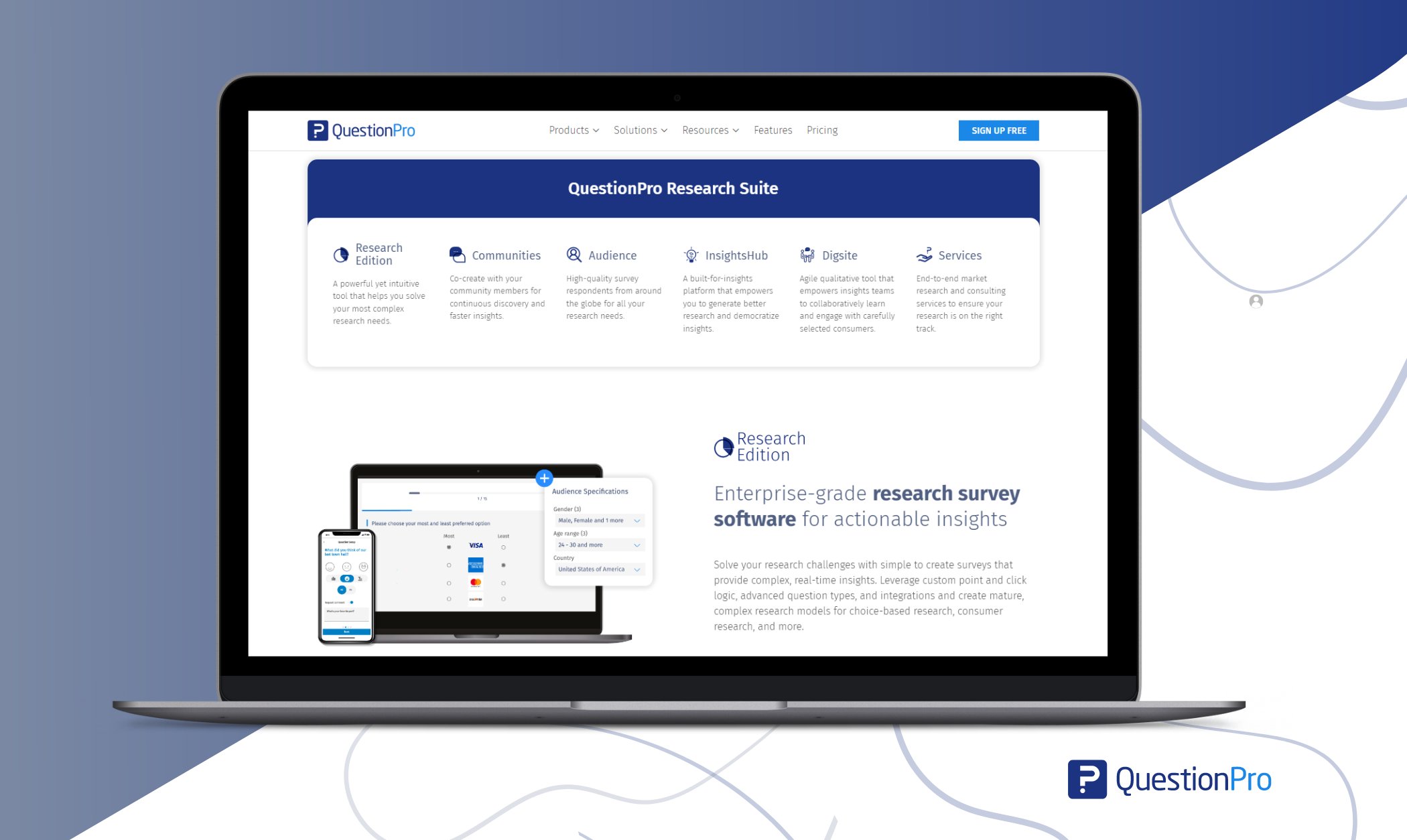
QuestionPro offers many free survey features, including customizable question types, Google Sheets integration, and robust analytics. With its user-friendly interface and comprehensive features, QuestionPro is a great choice for conducting market research and surveys to gather insights from its target audience.
How it Works: Users can create customized market research surveys using various question types and templates. The surveys can be distributed through email, social media, websites, or embedded into mobile apps. The platform provides robust analytics and reporting features to analyze survey responses in real time.
Features You Can Avail:
- Create unlimited surveys with up to 200 responses per survey.
- Access to basic survey templates and question types.
- Branching skip logic based on responses to a question.
- Trend analysis and geocoding survey responses.
- Basic reporting and analytics features
- Data visualization.
Pros:
- Easy-to-use interface for creating surveys.
- Up to 30 different question types.
- Integration with popular third-party tools like Salesforce and Google Sheets.
- Customizable branding options for surveys.
- Responsive customer support team.
Cons:
- Email support may have slower response times compared to premium plans.
2. Google Trends
Google Trends allows you to explore the popularity of search queries over time and across different regions. By analyzing search trends, you can identify emerging topics, monitor consumer interest in your industry, and track the effectiveness of your marketing campaigns.
How it Works: Users can enter keywords or topics into the search bar to view trends in search volume over time. The tool provides data on regional interest, related queries, and trending topics. Users can also compare the popularity of multiple search terms or topics.
Features You Can Avail:
- Access to search trends data for free.
- Explore historical search trends and regional interest.
- View related queries and trending topics.
Pros:
- User-friendly interface for exploring trends.
- Ability to compare multiple search terms or topics.
- Useful for identifying trending topics and keywords.
- Integration with Google Analytics for deeper analysis.
Cons:
- Limited to search data from Google’s search engine.
- Data may not always be representative of overall market trends.
3. SurveyMonkey
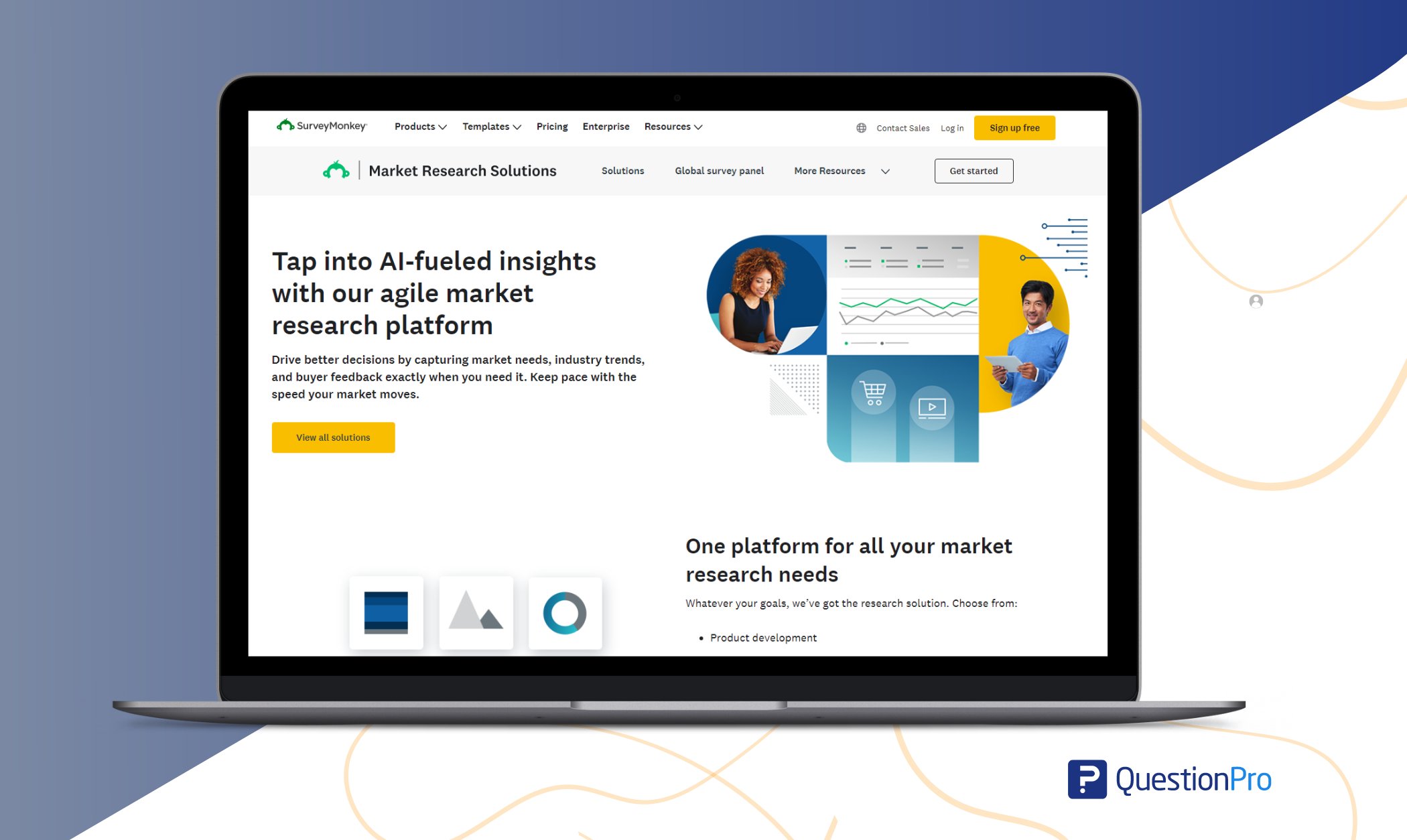
SurveyMonkey offers a free plan to create surveys, collect responses, and analyze data. With its intuitive survey builder and customizable templates, SurveyMonkey makes it easy to gather feedback from customers, employees, and other stakeholders.
How it Works: Users can create surveys using customizable templates and various question types. Surveys can be distributed through email, social media, websites, or embedded into mobile apps. The platform offers advanced analytics and reporting features to gain insights from survey responses.
Features You Can Avail:
- Create unlimited surveys with up to 10 questions per survey.
- Basic survey templates and question types.
- Collect up to 100 responses per survey.
- Basic reporting and analytics features.
- Email support.
Pros:
- A wide range of question types and templates are available.
- Multiple distribution options, including email and social media.
- Real-time analytics for quick insights.
Cons:
- There is a limited number of responses and questions in the free plan.
- Advanced features like skip logic and A/B testing are available only in paid plans.
4. Statista
Statista provides access to a vast database of statistics and market research reports across various industries. While some premium content requires a subscription, Statista offers a significant amount of free data to help you understand market trends, consumer behavior, and industry benchmarks.
How it Works: Users can search for statistics and reports on specific industries, countries, or topics of interest. The platform provides access to data from thousands of sources, including government agencies, industry associations, and market research firms.
Features You Can Avail:
- Access to limited statistics and infographics is free.
- Basic search and browsing capabilities.
- Limited access to reports and studies.
Pros:
- Access to data from reputable sources.
- Customizable charts and infographics for presentations.
- Ability to download data in multiple formats.
Cons:
- Limited access to data and reports in the free plan.
- Some statistics may require a premium subscription for access.
- Full access to reports and advanced features is available only in paid plans.
5. Google Analytics
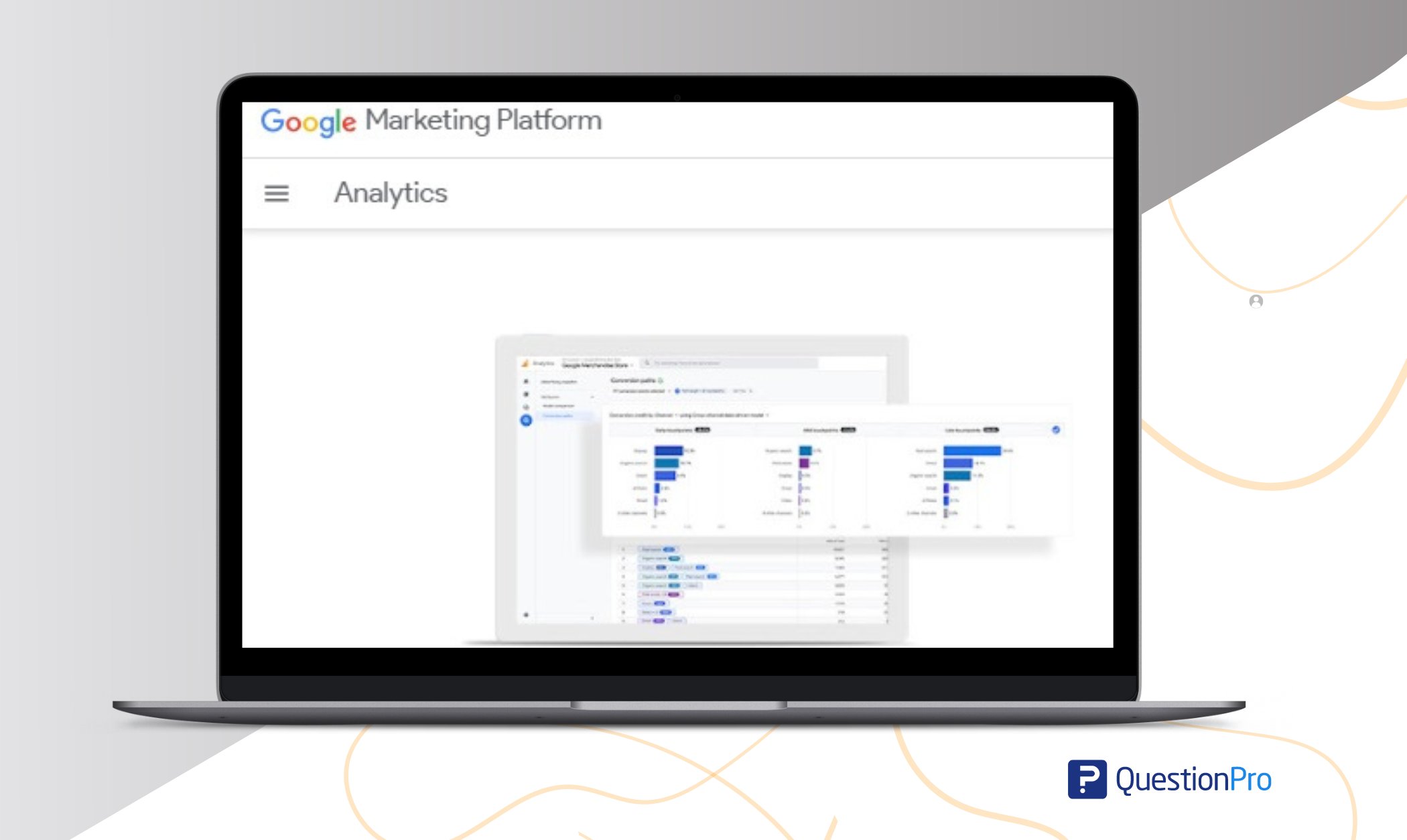
Google Analytics is a powerful web analytics tool that tracks website traffic, user behavior, and conversion metrics. By analyzing website data, you can gain insights into your audience demographics, engagement metrics, and marketing efforts’ effectiveness.
How it Works: Users can install a tracking code on their website to collect data about visitor interactions, page views, conversion rates, and more. The platform offers customizable reports and dashboards to analyze website performance and audience demographics.
Features You Can Avail:
- Access to basic web analytics features is free.
- Track website traffic, user behavior, and conversion metrics.
- Customizable reports and dashboards.
- Integration with other Google products like Google Ads and Search Console.
Pros:
- Comprehensive insights into website performance and user behavior.
- Customizable reports and dashboards for analyzing data.
- Real-time data tracking for up-to-date insights.
- Audience segmentation for targeting specific user groups.
Cons:
- Limited support for tracking offline interactions.
- Requires technical setup and implementation of tracking code.
6. Google Alerts
Google Alerts notifies you when new content related to specific keywords or topics is published online. You can stay informed by monitoring mentions of your brand, industry trends, and competitor activity and identify opportunities to engage with your audience.
How it Works: Users can create alerts for keywords, phrases, or topics of interest. Google Alerts will then send email notifications whenever new content matching the alert criteria is published online.
Features You Can Avail:
- Create unlimited alerts for free.
- Monitor keywords, topics, or phrases.
- Receive email notifications for new content.
- Adjust frequency and sources for alerts.
Pros:
- Free and easy-to-use monitoring tool.
- Set up alerts for specific keywords or topics.
- Receive email notifications for new mentions or content.
- Monitor brand mentions, industry trends, or competitor activity.
- Adjust alert settings for frequency and sources.
Cons:
- Limited to monitoring online content indexed by Google.
- May receive irrelevant or duplicate alerts.
- There are no advanced filtering options for alerts.
- Email notifications may not always be timely.
7. Qualtrics
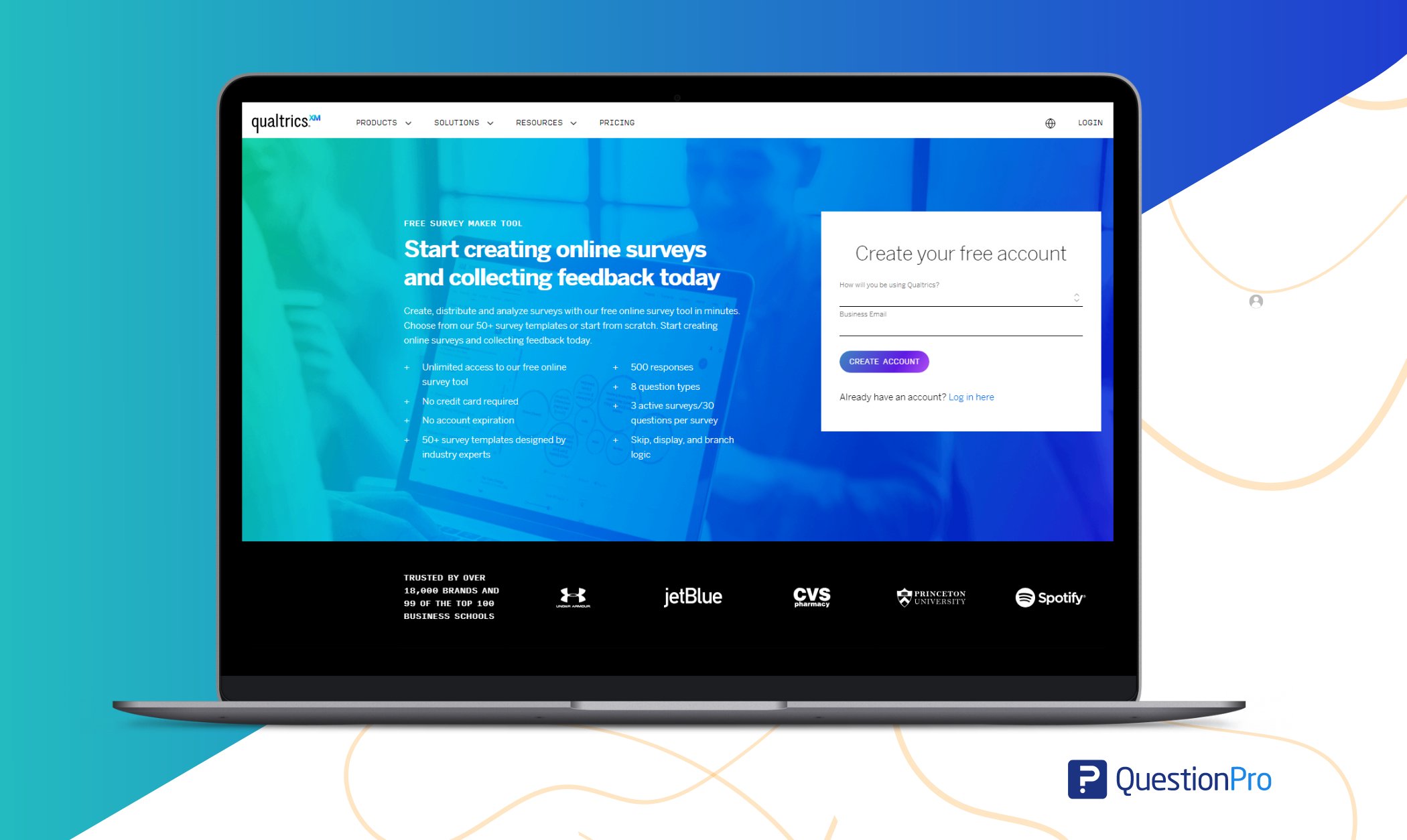
Qualtrics offers a free plan to create surveys, collect feedback, and analyze data in real-time. With its advanced features and customizable reporting options, Qualtrics is a valuable tool for businesses looking to gain insights into customer satisfaction, product usability, and market trends.
How it Works: Users can create surveys using a drag-and-drop editor or choose from pre-built templates. Surveys can be distributed through email, social media, websites, or embedded into mobile apps. The platform offers advanced analytics and reporting features to gain insights from survey responses.
Features You Can Avail:
- Access to basic survey creation and distribution features is free.
- Create unlimited surveys with up to 100 responses per survey.
- Basic reporting and analytics features.
Pros:
- Drag-and-drop editor and pre-built templates for quick survey creation.
- Multiple distribution options, including email and social media.
- Real-time analytics for quick insights.
- Integration with popular third-party tools like Salesforce and Slack.
Cons:
- There is a limited number of responses in the free plan.
- Advanced features like skip logic and branching are available only in paid plans.
8. Pew Research Center
The Pew Research Center conducts public opinion polling and demographic research on various topics. You can gain valuable insights into social and political trends, consumer attitudes, and demographic shifts by accessing free reports and datasets.
How it Works: The Pew Research Center publishes reports and studies based on surveys conducted among the general public, specific demographics, or expert panels. These reports provide insights into public opinion, attitudes, and trends on various issues.
Features You Can Avail:
- Access to reports, studies, and datasets for free.
- Explore research topics by category or keyword.
- Download reports and datasets in various formats.
- Email subscription for updates and notifications.
Pros:
- A trusted source of data and analysis on social and political issues.
- A wide range of research topics and reports are available.
- Access to raw data and datasets for further analysis.
- Regularly updated with new research findings.
- Suitable for academic research and policy analysis.
- Responsive customer support team.
Cons:
- Some reports and datasets may be restricted to paid subscribers.
- Limited to research topics covered by the Pew Research Center.
- Reports may have a lag time between data collection and publication.
- Limited customization options for data analysis.
9. Make My persona
Make My Persona is a free tool by HubSpot that helps you create detailed buyer personas based on customer demographics, behaviors, and goals. By better understanding your target audience, you can tailor your marketing messages and product offerings to effectively meet their needs.
How it Works: Users answer questions about their ideal customers’ demographics, behaviors, goals, and challenges. Based on the responses, Make My Persona generates a customized buyer persona template that can be used for marketing and sales strategies.
Features You Can Avail:
- Create one buyer persona for free.
- Answer questions to define your ideal customer profile.
- Generate a customized buyer persona template.
- Download the persona template in PDF format.
Pros:
- Easy-to-use tool for creating buyer personas.
- A guided questionnaire helps define the ideal customer profile.
- Customized persona template includes key details and insights.
- Suitable for businesses of all sizes and industries.
- Integration with other HubSpot tools for seamless workflow.
- Free and accessible for businesses with limited budgets.
Cons:
- Limited to creating one persona for free.
- Basic customization options for persona templates.
10. Qualaroo
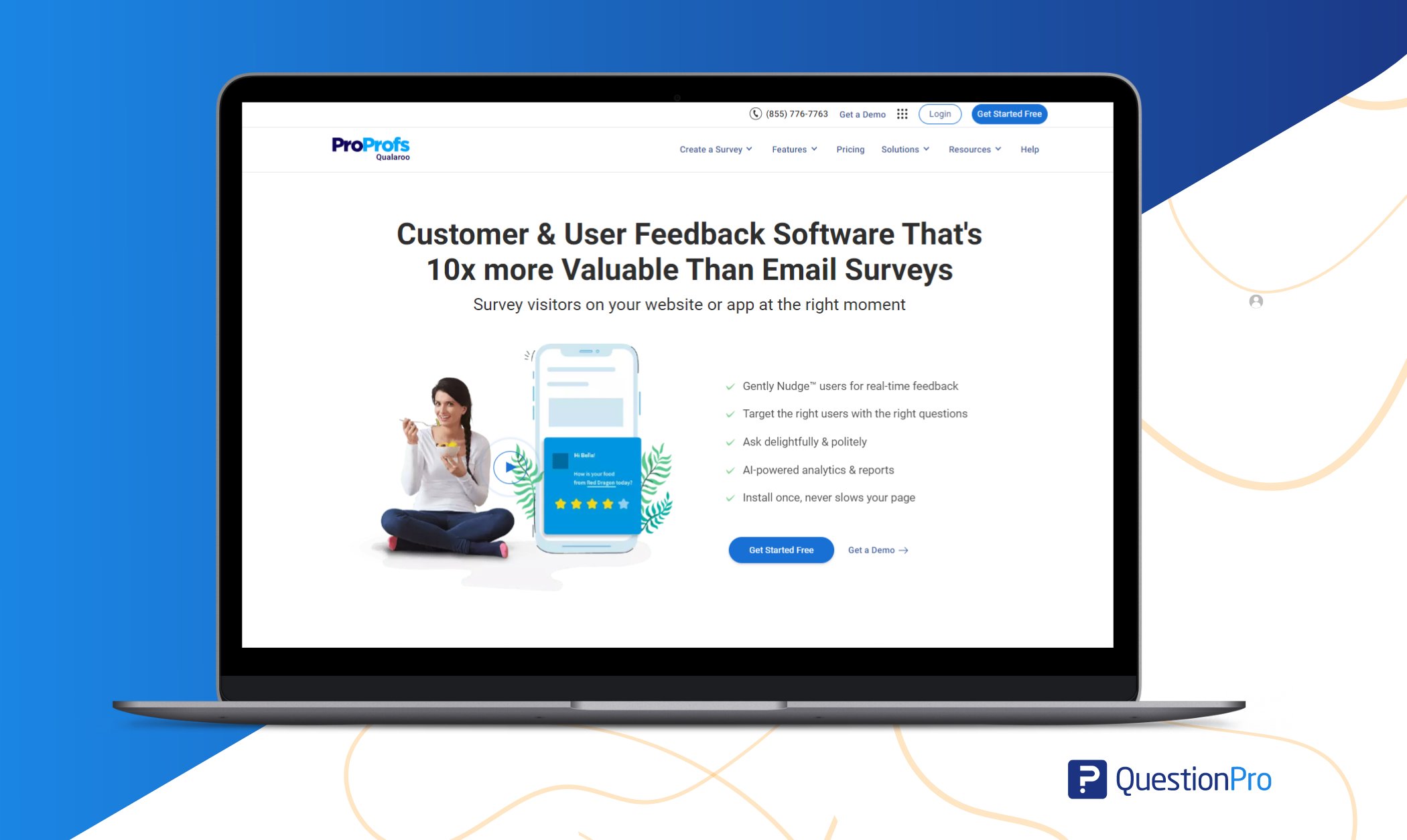
Qualaroo is a user feedback tool that helps businesses collect insights from website visitors through targeted surveys and feedback forms. With its customizable survey options and real-time feedback collection, Qualaroo enables you to gather actionable insights and improve the user experience on your website.
How it Works: Users can create customizable surveys and feedback forms that target specific segments of website visitors based on behavior, demographics, or other criteria. Qualaroo offers advanced analytics and reporting features to analyze feedback and identify actionable insights.
Features You Can Avail:
- Create unlimited surveys with up to 100 responses per survey.
- Basic reporting and analytics features.
Pros:
- Integration with popular analytics and CRM platforms.
- Customizable branding options for surveys.
- Collaboration features for team-based research projects.
- Responsive customer support team.
Cons:
- Integration with third-party tools may require additional fees.
If you want to know more, we have a blog about Top 5 AI Tools for Business and Uses for Research
Why Choose QuestionPro as The Best Free Market Research Tool?
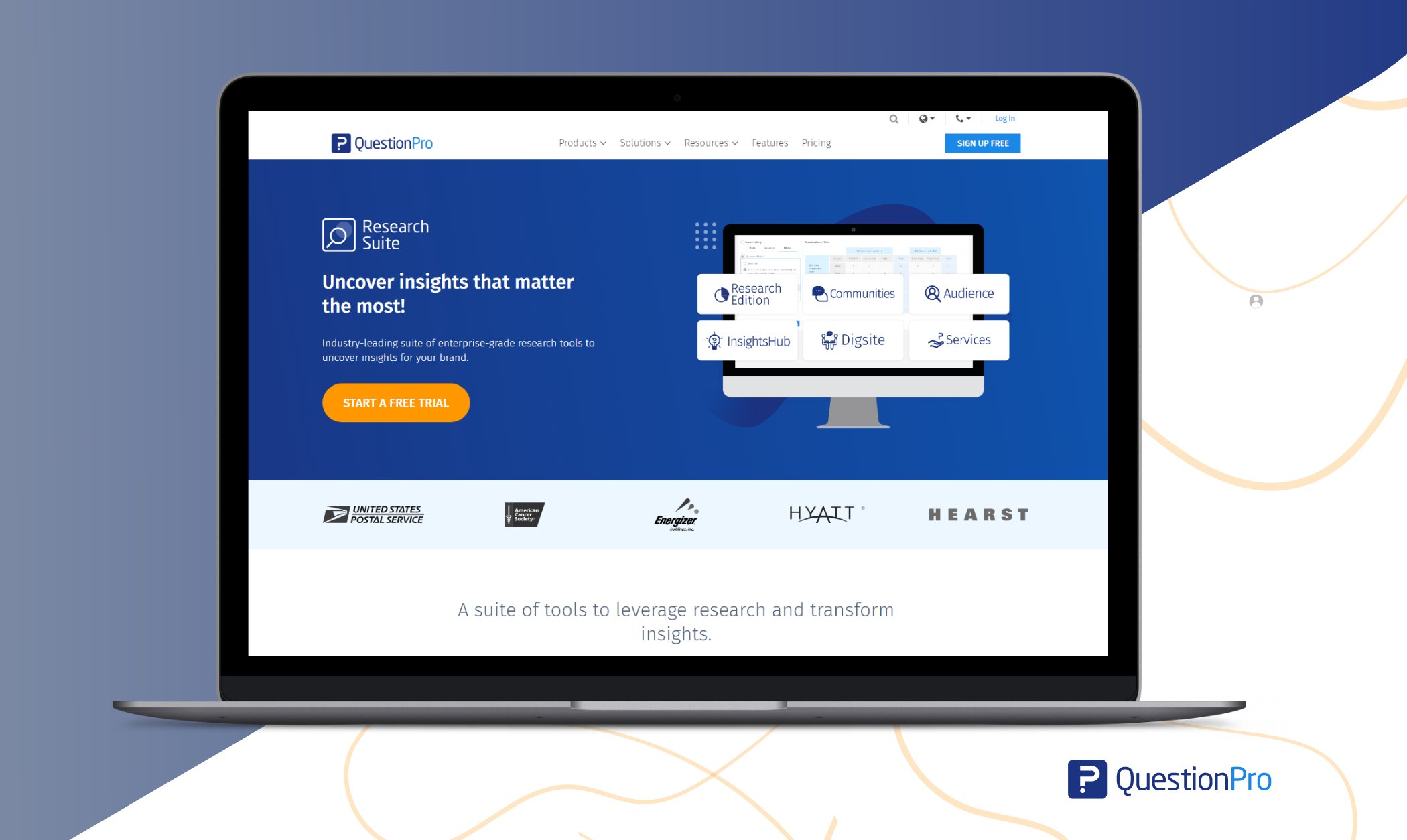
Understanding your market is crucial for business success in today’s competitive landscape. This is where market research tools like QuestionPro come into play. Here’s why you should choose QuestionPro as your go-to free market research tool:
- Comprehensive Features: QuestionPro offers a comprehensive suite of features to meet all your market research needs. From survey creation to data analysis, you’ll find everything you need to gather insights and make informed decisions.
- Free Forever: Unlike many other market research tools that offer limited free trials, QuestionPro is free forever. You can access essential features without any time restrictions, allowing you to conduct market research without worrying about costs.
- Wide Range of Question Types: With over 50 question types available, QuestionPro allows you to design surveys that meet your specific requirements. Whether you need multiple-choice questions, rating scales, or open-ended responses, you’ll find the right tools.
- Google Sheets Integration: QuestionPro is the only survey platform that offers free seamless integration with Google Sheets. This feature allows you to easily export and analyze survey data using familiar tools, streamlining your research process.
- Multiple Distribution Channels: QuestionPro’s multiple distribution channels allow you to reach your target audience wherever they are. Whether you prefer email surveys, social media polls, or website embeds, you can effectively engage with your audience.
- Customization Options: Use QuestionPro’s customization options to personalize your surveys to align with your brand identity. From branding elements to question formatting, you have the flexibility to create surveys that resonate with your audience.
- Seamless Collaboration: Use QuestionPro’s collaboration features to collaborate seamlessly with your team members on research projects. Share surveys, analyze data together, and brainstorm strategies in real time, enhancing productivity and efficiency.
Conclusion
These free market research tools provide valuable resources for businesses looking to understand their target audience, monitor industry trends, and make data-driven decisions. By leveraging these tools effectively, you can gain consumer insights that will help you boost your business and stay ahead of the competition in today’s dynamic market environment.
QuestionPro offers a powerful and user-friendly platform for conducting free market research. With its comprehensive features, intuitive interface, and dedicated support, QuestionPro is the right choice for businesses looking to gain valuable insights and stay ahead of the competition.
So why wait? Start using QuestionPro as your market research tool today and take your business to new heights with QuestionPro!
Frequently Asked Questions (FAQs)
These tools typically offer access to demographic data, consumer behavior trends, industry reports, competitor analysis, and market segmentation information.
While free tools provide valuable insights, they may not offer the depth or customization of paid services. Businesses often use a combination of both for comprehensive analysis.
These tools provide cost-effective ways for businesses to access valuable market data, understand customer preferences, track competitors, and make informed strategic decisions.
While free market research tools may not offer the depth of premium tools, many free tools provide credible data sourced from reputable databases and research sources.





